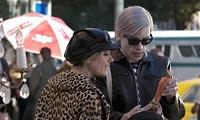"Factory Girl" | We hardly get to know her at all

Edie Sedgwick was famous for being fabulous. A trust-fund baby from an aristocratic New England family, she wafted her way to New York in the '60s and joined Andy Warhol's gang of artists and hangers-on at his studio, the Factory. She starred in a few of Warhol's films, danced all night, did a lot of drugs, became a symbol of an era, spent all her money; in short, she burned her candle at both ends. Too soon, she went from who's-that-girl to yesterday's girl: After the Factory crowd moved on, she spent some time in a rehab hospital and died of an overdose shortly afterward. She was 28 years old. "It was just so long ago," said Warhol, upon hearing of her death. "I hardly knew her at all."
It's a sad, haunting story — but George Hickenlooper's "Factory Girl" does little to show us why we should care. (For more reason, see Jean Stein's fascinating 1982 best-seller "Edie: An American Biography," which tells Edie's story through the voices of those who knew her.) Sienna Miller, as Edie, captures some of her dazzle: Her smile is irresistibly playful; her insouciance as she sashays around in outrageous '60s fashions (often featuring black tights and silvery hair) draws you to her.
But once you're drawn, there's little else there: Miller is playing an icon, not a woman. Hickenlooper and screenwriter Captain Mauzner have given her little to play beyond the posturing and fabulousness. Perhaps the real Edie kept herself well-hidden (little emerges, even in Stein's book, from unguarded moments), but a character who's perpetually arch until she disappears into drug-sodden incoherence is a difficult peg on which to hang a film. She's beautiful, and Miller gives her a butterfly energy that's appealing, but this Edie is too elusive to hold our interest.
More interesting is Guy Pearce's Warhol, who slinks nervously through the film, his mouth slack with affected ennui. It's a carefully detailed performance that seems (based on a bit of footage of the real Warhol at the end) remarkably close to its subject. But he's just a subplot here, though more interesting than the main story. Truman Capote, speaking in Stein's biography, gives an intriguing assessment that the movie only hints at: "I think Edie was something Andy would have liked to have been; he was transposing himself into her à la Pygmalion."
Hayden Christensen is miscast as the famous, harmonica-playing musician with whom Edie has an affair (it's clearly Bob Dylan, who isn't named for legal reasons); Christensen seems too young and too sleepy to be convincing in the role. Illeana Douglas, in orange lipstick, has a few striking moments as Diana Vreeland, the fashion editor who briefly worked with Edie. But ultimately, the movie needs to be held up by Miller, and she's not given enough of a character to do so. "Factory Girl" leaves its watcher with a vague sense of tragedy and wasted youth, but an absence at its center; ultimately, it's about a girl who nobody knew.
Moira Macdonald: 206-464-2725 or mmacdonald@seattletimes.com
"Factory Girl," with Sienna Miller, Guy Pearce, Hayden Christensen, Jimmy Fallon, Jack Huston. Directed by George Hickenlooper, from a screenplay by Captain Mauzner. 97 minutes. Rated R for pervasive drug use, strong sexual content, nudity and language. Neptune. The director and stars discuss Edie Sedgwick and the film Northwest Life.